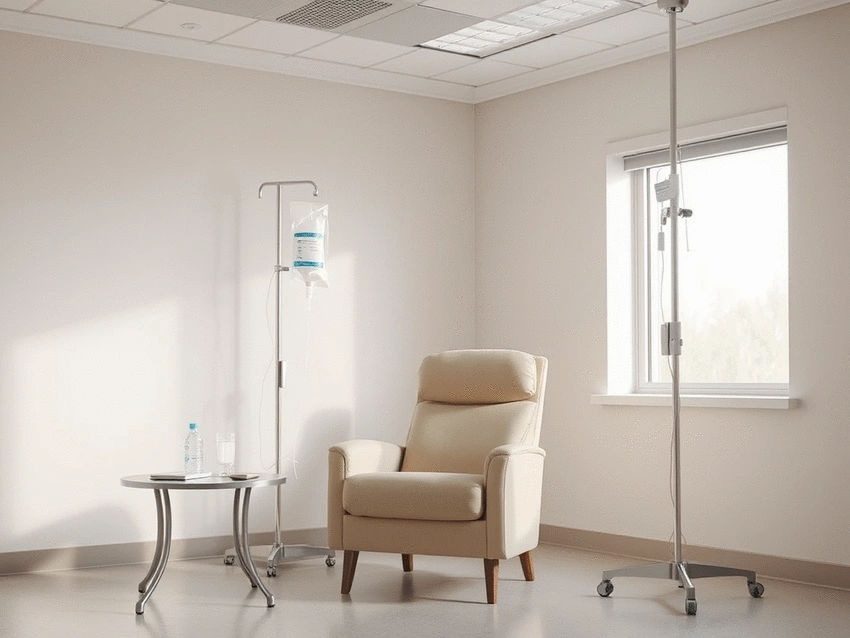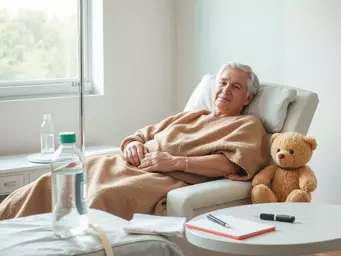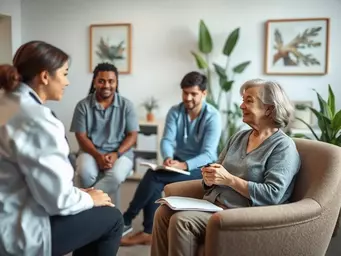Support Resources During Chemotherapy
By Dr. Elise Carter / Jan 28
Have you ever felt overwhelmed at the thought of a major medical treatment? The uncertainty and anxiety can be daunting, especially when facing chemotherapy for the first time. Understanding the process can empower you to navigate this journey with confidence.
Understanding the chemotherapy process can help ease anxiety. This visual guide outlines key steps and essential items for your first appointment.
Arrive early, complete paperwork.
Nurse checks BP, heart rate, temp, O2.
Discussion with healthcare team.
Medications & potential side effects.
Preparing for your first chemotherapy session can feel daunting. I remember how overwhelming it was to face the unknowns of treatment. Understanding what to expect can help ease some of those anxieties. During your first appointment, you'll typically go through a series of steps that include check-in, taking vital signs, and undergoing initial assessments. This timeline ensures you're ready to begin treatment safely and effectively.
After checking in, you'll often meet with a nurse who will record your vital signs and conduct a brief health assessment. This process is important as it helps your medical team tailor the treatment to your specific needs. Have you thought about how you might feel during this first visit? Knowing what to expect can provide some comfort and allow you to focus more on your treatment journey.
Your first chemotherapy appointment often follows a well-defined process. Here’s a quick overview of what typically happens:
This structured approach allows your team to ensure that you are physically ready for treatment and helps you feel more at ease. Have you considered jotting down any questions you might have for your healthcare providers during this time?
Preparation includes gathering essential items that can enhance your comfort during the session. As Roswell Park suggests, having a well-prepared bag can make a significant difference. Here’s a list of items I suggest bringing along:
These simple items can make a big difference, helping you feel more relaxed and in control. Remember, comfort is key during treatment, and every little bit helps!
Before jumping into treatment, a pre-treatment consultation is critical. In this meeting, your medical team will discuss the specifics of your treatment plan and drug regimen. This is a chance for you to ask questions and express any concerns you have. It's also an opportunity to clarify what will happen during your chemotherapy sessions, as outlined in guides like the MD Anderson Chemotherapy Guide.
During this consultation, you might discuss:
Being informed and engaged in this process can empower you and provide peace of mind. Have you thought about what questions you might bring to this important meeting?
It's perfectly normal to feel anxious before your first chemotherapy session. Acknowledging these feelings is the first step in managing them. I often remind my patients that effective stress management can significantly impact their treatment experience.
As you prepare for treatment, consider incorporating strategies into your routine that can help you cope with anxiety. One effective method is practicing deep breathing exercises, which can calm your mind and body. Mindfulness practices, such as meditation or gentle yoga, can also be beneficial.
Here are some specific techniques that can ease pre-treatment anxiety:
Incorporating these techniques into your daily routine can create a sense of calm. Have you tried any of these practices before? You might find them comforting as you navigate this journey!
Your support system plays a crucial role in managing anxiety and stress. Caregivers and family members can help prepare themselves to provide the emotional support you need during this time. Having loved ones by your side can help you feel less isolated and more empowered. The American Cancer Society provides valuable information on how to prepare for chemotherapy, including the importance of a strong support network.
To prepare your family and caregivers, consider discussing the following:
When your support system is prepared, you can focus more on your own healing journey. It’s a team effort, and you are all in this together!
Finding emotional support during chemotherapy can be incredibly beneficial. There are many resources available to help you cope with your feelings. Professional counseling, support groups, and helplines can provide you with the assistance you need.
Consider exploring the following options:
Don’t hesitate to reach out for help. Finding the right emotional support can make a significant difference in your treatment experience.
Your first appointment typically involves a check-in, vital sign assessment, initial conversations with your healthcare team about your health and treatment plan, and a discussion about the medications and potential side effects.
It's recommended to bring documentation (insurance, medical records), comfortable loose-fitting clothing, personal comfort items like a blanket, snacks, entertainment, and a water bottle to stay hydrated.
A pre-treatment consultation allows your medical team to discuss your specific treatment plan, drug regimen, and potential side effects. It's also an opportunity for you to ask questions and clarify any concerns, empowering you with information.
Effective stress management techniques include deep breathing exercises (inhaling through the nose, exhaling through the mouth), visualization of peaceful scenes, and mindfulness practices such as guided meditations or calming music.
Caregivers and family can provide emotional support through open communication, accompanying you to appointments, and ensuring they also take care of their own well-being. Their involvement creates a strong support system for your journey.
As you prepare for your chemotherapy journey, what concerns or questions do you have? Share your thoughts below:
Preparing for chemotherapy can feel overwhelming, but focusing on a few key strategies can make a significant difference. As I've shared throughout this article, understanding what to expect during your treatment and having the right support in place is crucial. Here are some essential takeaways:
Remember, every patient's journey is unique. It's vital to adapt these strategies to suit your personal needs and preferences, allowing you to feel more in control as you embark on this chapter of your cancer journey.
As you navigate your chemotherapy treatment, seeking out additional support can provide comfort and reassurance. Support groups, whether in-person or online, allow you to connect with others who are facing similar challenges. Consider exploring:
Finding a supportive network will not only help you cope but can also empower you to embrace your treatment journey with greater confidence!
To help you stay organized and ensure you have everything you need for your treatment day, I invite you to download our Chemotherapy Preparation Checklist. This resource includes:
You can find the checklist [here](#) and print it out to use as you prepare for your session. This simple tool can enhance your readiness and reduce anxiety as your treatment day approaches!
Being well-informed about your treatment options is key to feeling empowered. At Types of Chemotherapy, we offer a variety of educational resources designed to enhance your understanding of chemotherapy. Here are a few valuable resources to explore:
By leveraging these resources, both you and your caregivers can gain the knowledge needed to navigate the complexities of chemotherapy confidently!
Here is a quick recap of the important points discussed in the article:

 Support Resources During Chemotherapy
Did you know that support resources can significantly ease the journey through chemotherapy? Underst
Support Resources During Chemotherapy
Did you know that support resources can significantly ease the journey through chemotherapy? Underst
 Supporting Mental Health in Chemotherapy
When you think about cancer treatment, how often do you consider the emotional toll it takes on pati
Supporting Mental Health in Chemotherapy
When you think about cancer treatment, how often do you consider the emotional toll it takes on pati
 Chemotherapy's Impact on Relationships
Have you ever considered how a cancer diagnosis can reshape the relationships around you? The emotio
Chemotherapy's Impact on Relationships
Have you ever considered how a cancer diagnosis can reshape the relationships around you? The emotio